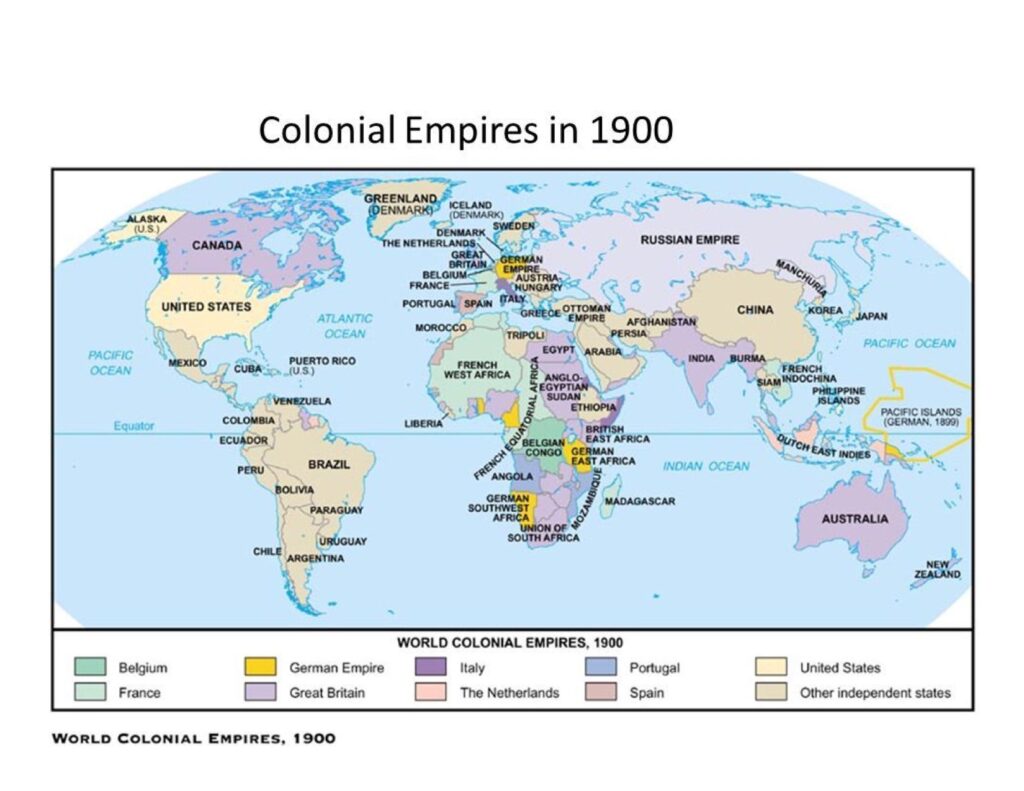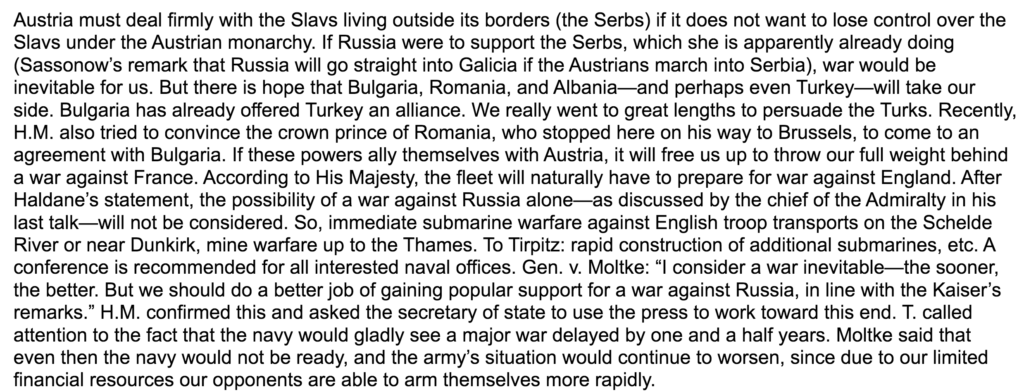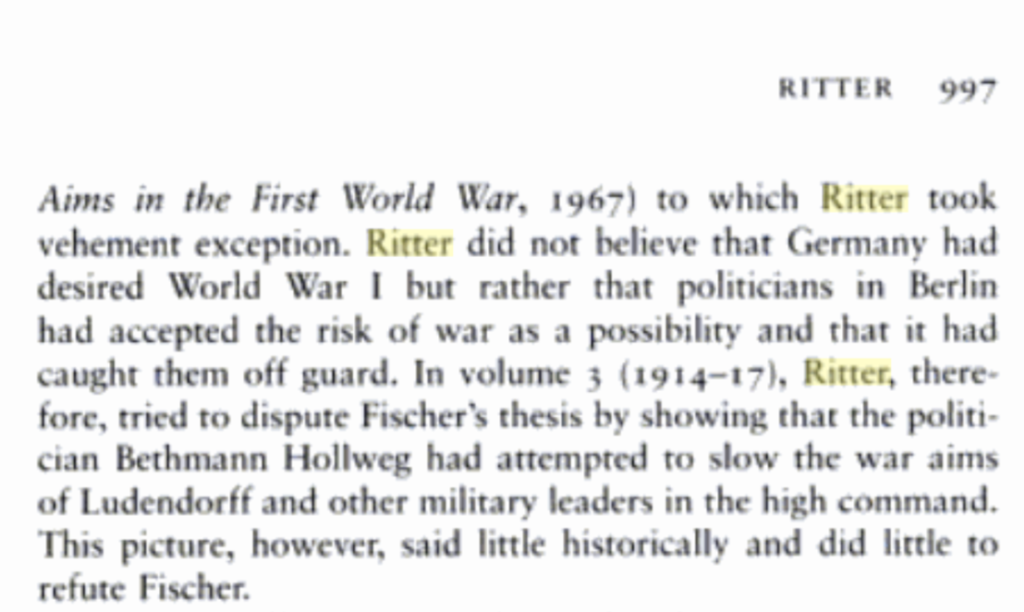Austria-Hungary
- Austria lost a war against Prussia in 1866. To maintain power in Europe, they joined Hungary to form the new country, although power was largely in Vienna and not Budapest.
- German Chancellor Bismarck decided to keep Austria in check (and to avoid isolation) by becoming allies with them in 1879. He signed the Dual Alliance where both countries agreed to support each other if attacked by Russia and to maintain neutrality if by another.
- Austria-Hungary was an empire with many nationalities, religions and cultures. Consequently, it was a difficult balance to maintain control over them. Force was often used as the tool to ensure this.
- The empire rested on former glories, it was no longer the military force is used to be (the first half of the 19th century) although many in the country believed it was.
- The decline of the Ottoman Empire led to power vacuums and the rise of nationalism in the Balkans. This led to instability in the Austro-Hungarian Empire, particularly amongst the Slavs. For both political and military reasons, Austria-Hungary wanted influence over the Balkans. Moreover, any country that stirred up the Slavs such as Serbia needed to be stopped.
- Economically, the empire did not rival the other major European powers.
- Militarily, the empire understood the power of its ‘ally’ Germany. It needed her support in case of Russian aggression and had to demonstrate loyalty too.
- Ideologically, Germany and Austria-Hungary were monarchies with empires. It was not inevitable that these two countries would become allies but perhaps preferable to the republics of France and Britain. This is supported when allying with Italy, another monarchy, in 1884, with the Triple Alliance.
Austria-Hungary to blame…
- Conrad, the Austrian Chief of Staff from 1906 to 1917, continued to push for war before and up to 1914. Serbia was his preference, especially after their success in the Balkan Wars, but he even pushed for war against Italy, who was an ally.
Britain

- British foreign policy in the 19th and 20th centuries was dominated by the empire. It guarded and maintained their colonies and dominions through the navy and diplomacy. If there was a trouble spot in their empire, the Royal Navy could bring troops and supplies to put it down.
- For this reason, the bulk of the Royal Navy was spread out around the world, not protecting the islands in the North Sea. Therefore, if any European country significantly increased the power of their navy, especially in Northern Europe, this could change the balance of power on the continent and be a direct threat to British security. She could either reach an agreement with the growing naval power to limit their growth, become an ally (Anglo-Japanese Alliance 1902), or stop their production by force (1914?).
- Britain’s empire grew with the help of their 19th-century foreign policy ‘splendid isolation‘. The continent of Europe had had hundreds of wars in its history and would probably have more if Britain had not stayed out of European conflicts as much as it did. Britain opted to focus its ambitions beyond Europe to improve its trade and power, largely ignoring the problems on the continent.
- Britain to blame…
France
- Alsace-Lorraine
- Fashoda
- Dual Entente
- Triple Entente.
- Morocco and imperial ambitions.
Germany
- Bethmann-Hollweg
- Naval Race, Kaiser, Tirpitz
- Boxer Rebellion
- Franco-Prussian War
- Morocco
- Telegram
- Arms Race. It is difficult to decide who began the militarism of Europe but the map below shows you how much the Europeans were spending before 1914. One can argue they escalated the tension although equally the countries may have armed themselves as a deterrent.

- Germany to blame because of their ‘blank cheque’, imperial ambitions and aggressive foreign policy. Fritz Fischer, a German historian, argued that the ‘blank cheque’ should mean that they take the majority of the blame for starting the war.

- AJP Taylor and Gerhard Ritter argued that the Schlieffen Plan was to blame for the war. It had rigid timetables to adhere to which left little time for negotiation if war broke out. Other countries did not have the same plans so were more flexible.
Italy
- Triple Alliance 1882
- Abyssinia 1895-96
- Italo-Turkish War 1911-12, Libya
- Italy to blame…
Russia
- Dual Alliance/Entente 1894
- Russo-Japanese War 1904-5
- Triple Entent 1907
- Bosnian Crisis 1908
- Balkan Wars 1911-12
- Declaration of War by Austro-Hungary on Serbia 1914
- Russia to blame…
All

All countries were to blame because …
The militarist policies were to blame…
The expansionist and imperial policies were to blame because…
Historians and Historiography
World War One: 10 interpretations of who started WW1
Max Hastings
Christopher Clark wrote Sleepwalkers in 2013.
- The Serbian government was not complicit in the assassination. The president knew that arms were being moved from his country into Bosnia but knew that any violence against Austro-Hungary would bring harsh consequences.
- The great majority of statesmen in 1914 would not expect a large European war. They had overcome crises such as Morocco, Bosnia and the Balkans wars and remained peaceful. Perhaps these events may have given these statesmen a false sense of security.
- Clarke focuses on ‘how’ a peaceful Europe went to war in July 1914, not ‘why’. His rationale is that the latter assumes blame, the focus of the debate since 1914. Clarke wanted to do something different.
- He argues that government foreign policies within the Great Powers switched between individuals and departments because of the pressure they were put under. Therefore, there was confusion in these governments about what they should do.
- 1911 Italian-Libyan War arguably the first war of aggression in which all others followed. This was the first war involving aircraft and bombs dropped from them. This was an example of how Europe was not at peace before 1914.
- Sleepwalkers was well-received because it gave a different perspective. However, criticism included that he was trying too hard to find a way of exonerating Germany.
In order or appearance,
Niall Ferguson – There was there no winner of the First World War such was the casualty count among the participants? Moreover, he criticises the British government (citing his book The Pity of War, 1998) for entering into the conflict. The Cabinet was deeply divided and took the decision despite not being prepared to fight a war. However, he also adds that an argument could be made for the European leaders and upper-classes deciding upon a war to rid themselves of the threat from the socialists. A war would centralise power and a victory would make it last.
Later, Ferguson argues that the September Programme would not have been published had Britain not entered the war in 1914. Furthermore, Germany miscalculated in its strategy; it was never their intention to fight Britain. But he also offers a controversial view, that if Britain did not fight, and Germany won the First World War as a result, in the long-term she would be weaker. Controlling all of Europe, especially the east, would prove very difficult and very expensive. This would allow Britain to get stronger, similar to the Napoleonic Era.
Margaret Macmillan argues that the countries who took the fateful decision to fight in 1914 were lacking both imagination and courage. They claimed there was no choice but to fight. Albeit with hindsight, they were wrong.
Allan Mallinson explains that Britain only got involved because of the German invasion of Belgium. It broke the 1839 Treaty of London and the Cabinet felt that reneging on the rules of the agreement would severely affect their standing in the world.
David Olusoga argues that the crimes and behaviour of the German army made the war worth fighting. He argues that their genocide in Africa and 1914 September Programme meant that the British had to declare war on Germany.
The famous AJP Taylor on the causes of the First World War. He argues railway timetables were to blame! Barbara W. Tuchman’s, below, agrees.
Barbara W. Tuchman’s Guns of August, published in 1962, argues that the alliance system and the railway timetables designed for future military operations were to blame for starting the First World War. The latter focuses on the Schlieffen Plan and the requirement to defeat France quickly, moving hundreds of thousands of troops in the process, before attacking Russia.
Margaret MacMillan “there is still no historical consensus about the origins of the war, and particularly about who is to blame for it. “The consequences were so great, but we still don’t understand how it started.”
Raffael Scheck argues that Germany was to blame for the First World War because in 1914 “The German government, in particular, felt under increasing pressure from the generals and from right-wing opinion to wage war at the next feasible opportunity. Diplomatic means to counteract the encirclement of the country had proven counterproductive and seemed exhausted”. Raffael Scheck and German responsibility
Robert Massie blames Kaiser Wilhelm II for much of the growing tension between the European powers. Furthermore, German politicians are also criticised, although many merely press ahead with an aggressive foreign policy to win favour with the Kaiser.
On the other hand, Paul Gottfried argues that “The German fear of “encirclement [Einkesselung]” was justified, and particularly after the Franco-Russian alliance in 1894″. Furthermore, “The First World War was avoidable on both sides; and it was the old order that recklessly blundered into it, although that order hastened its own destruction by unleashing the war. It has also been the Right that has typically regretted the First World War as the destroyer of an older and better world.” Innocence of Germany
Niall Ferguson agrees with Gottfried in that he blames Britain and Edward Grey, the Foreign Secretary, for the escalation into global conflict in 1914. “Britain’s intervention in 1914 was “nothing less than the greatest error of modern history,” because Germany in fact did not pose an essential threat to British interests. So Ferguson indicts London, because “it was the British government which ultimately decided to turn the continental war into a world war, a conflict which lasted twice as long [as] and cost many more lives” than it would have if only Britain had not stepped in the way.” Was the Great War Necessary? The Atlantic
Graham Goodlad cites Fritz Fischer in that he drew attention to the War Council of 1912 (see below). The political difficulties involving the rise of the SDP were discussed. A war where Germany became dominant in Europe, (even more so – my words), would negate their influence, (I don’t agree). Graham points out that many conservative historians refute this, (he does not say when, presumably recently, but they would if called conservative).

Fritz Fischer famously blamed the Imperial German Government for the First World War. ‘Fischer was given access, in the 1950s, to the East German archives at Potsdam, where he came across an explosive set of files relating to war aims and annexationist plans that the Reich government had drawn up in World War I. It was not merely the extent of Germany’s territorial ambitions that moved him to develop his provocative hypotheses, but also the suspicion that the German government might have started the war in the first place in order to realize its expansionist program on the European continent.’ https://www.historians.org/publications-and-directories/perspectives-on-history/march-2000/in-memoriam-fritz-fischer
Opposing Fischer was Gerhard Ritter.

Historiography of World War One
Guns of August – The Daily Beast
Guns of August – Hoover Institute
Gary Sheffield
Oh, What a Lovely War
Blackadder
Causes of the First World War – A Preventable War
BBC – 37 Days
